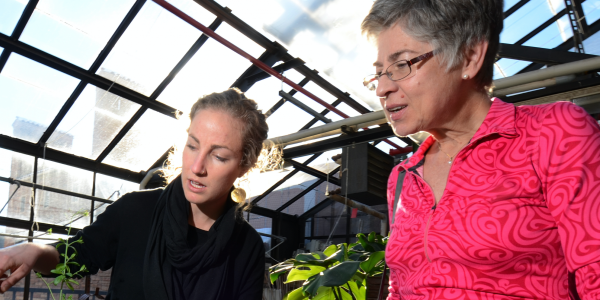Preliminary results show participants' average GPAs rising 0.75 points in fall 2016 and 0.96 points in spring 2017
Underperforming students have a new type of support system at the University of Colorado Boulder. Academic coaching, in addition to enhanced academic advising, boosts retention and graduation rates through innovative, individualized attention.
The Academic Advising Center in the College of Arts and Sciences recognized an opportunity to bolster its student services and did so by introducing an academic-coaching program to its established advising structure. The practice is being increasingly used across a variety of colleges and universities.
Academic coaches work with students who are performing poorly in their coursework and are on academic alert or probation. Such students can be adult learners, or first-year, transfer, continuing or international students.
The academic coaches in arts and sciences provide personalized support to undergraduate students facing academic difficulty in addition to the attention they receive from their instructors, advisors and campus staff.
"How we do that is based on the individual and what they need to fulfill their potential at CU," said Eryn Elder, an academic coach. "According to research, when students have meaningful interactions with faculty and staff on campus, student outcomes improve. Therefore, we use that knowledge in conjunction with intentional programmatic efforts to encourage student success."

Alana Davis-Delaria (left) and Eryn Elder are academic coaches at CU Boulder. Photos by Patrick Campbell.
Eligible students are invited to participate in the no-cost, non-credit-bearing Academic Coaching Program for one semester in either a group or one-on-one setting. In the initial, individual meeting, coaches get to know the students and introduce them to the program, thus enabling themselves to identify priorities and develop a plan to best help their students meet their goals.
Coaches also provide students with a syllabus outlining program expectations and objectives, as well as a coaching guidebook, including worksheets and resources that students can use to develop self-awareness and the skills necessary to succeed in college-level coursework.
Coaches help each student develop a success plan by focusing on a number of strength and challenge areas:
- Goal setting
- Motivation
- Time management
- Note taking and processing
- Test preparation and study techniques
- Test taking
- Connections and campus resource awareness
- Wellness
When opting for the individual coaching format, students commit to meeting with their coaches at least five times per semester, though exceeding the requirement is encouraged. Many meet with their coaches six to eight times over the term, generally for an hour every two weeks. During these meetings, coaches help students:
- Establish attainable goals
- Assess barriers to academic success
- Develop and maintain positive routines
- Improve time-management and organizational skills
- Develop a study schedule
- Take effective notes and prepare for exams
- Balance academic demands
- Establish a rapport with their professors
- Explore and use campus resources
- Improve reading and note-taking
- Prepare for tests
- Test-taking
In the fall 2016 semester, 66 students completed the academic-coaching program; 105 participated in spring 2017. Jenny Simmons, assistant director for academic coaching, who also serves as a part-time academic coach, staffs the program with two full-time coaches, and she's hiring a third.
Not only do they serve as positive change agents for the incredibly diverse group of students they support, they also represent the absolute best values of what it means to be committed, academic support professionals on our campus."
"The commitment made by our academic coaches to better the undergraduate experience for the students who participate in coaching is nothing short of remarkable," said David Rogalski, director of student success in the Academic Advising Center.
"Not only do they serve as positive change agents for the incredibly diverse group of students they support, they also represent the absolute best values of what it means to be committed, academic support professionals on our campus."
Preliminary results show the positive impact of the academic coaching program on its students. Among those who participated in fall 2016, the average GPA increased 0.75 points, from 1.69 to 2.44. The 105 participants in spring 2017 raised their average GPA 0.96 points, from 1.52 to 2.48.
"We become a member of the students' success team here at CU. We partner with students' academic advisors, faculty members and other resources on campus to ensure the student is feeling supported and connected on campus," coach Alana Davis-Delaria said.
"Coaches do not take the place of an academic advisor—in fact, students are required to meet with their academic advisor, course instructors and other campus resource staff members while participating in academic coaching."
The academic coaches have found that some students arrive at CU Boulder without an established concept of what it takes to be successful in college. In high school, students had a set schedule and oversight network. Stepping on to a large research institution where they are suddenly responsible for all aspects of their achievement can be overwhelming.
"Our goal is to collaborate with students for one academic term to assist them in developing the skills necessary for success, so that they continue to do well in future academic terms," Elder said.
"We then offer monthly drop-ins for students who participated in academic coaching in prior terms, so that we can stay connected and offer support if needed. I see substantial change in the students’ self-awareness and in a general awareness of what it takes to be successful in college."
When working with students in the program, Davis-DeLaria, who earned her bachelor’s in political science in 2002, draws on her experiences both as a staff member and transfer student at CU Boulder.
"I struggled during my first semester at CU," Davis-DeLaria said. "I've enjoyed taking all the experience I've amassed as a student at CU and while working in the advising center to help students who are experiencing academic challenges —truly, that is what is most rewarding in my role as an academic coach."



